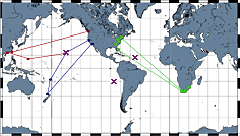Project Volunteer Observing Ships for Climate Studies (VOSClim)
| Location Map |
 |
| Horizon Enterprise (red); Columbus Florida (blue); SeaLand Express (green); moorings (x) |
| Volunteer Observing Ship |
 |
| The Volunteer Observing Ship SeaLand Enterprise. |
Further information, data access, and plots of VOS deployments are on the UOP VOSClim project Web site.
Overview
VOSClim is an ongoing project within the traditional Voluntary Observing Ships (VOS) program. It aims to provide a high-quality subset of marine meteorological data, with extensive associated metadata, to be available in both real-time and delayed mode to support global climate studies. VOSClim is a follow-up to the earlier VOS Special Observing Project North Atlantic (VSOP-NA) which was conducted on behalf of the World Climate Research Program (WCRP) from 1988 to 1990.
Data from the project will be invaluable for climate change studies and research. In particular it will be used to:
- Provide input to air-sea flux computations, as part of coupled atmosphere-ocean climate models;
- Provide ground truth for calibrating satellite observations
- Provide a high quality reference data set for possible re-calibration of observations from the entire VOS fleet.
As part of this program, the Upper Oceans Processes Group (UOP) has outfitted a number of ships with Air-Sea Interaction Meteorology (ASIMET) instrumentation packages. The instruments are turned around at intervals of roughly six months, and the sensors are recalibrated at WHOI. At present, the data are internally recorded and downloaded during the sensor turn-around.
Sponsors
The WHOI VOS program is supported by the National Oceanic and
Atmospheric Administration (NOAA)
Climate Program Office(CPO), Ocean
Observing and Monitoring Division. Operations in the Atlantic are
funded through the Cooperative Institute for Climate and Ocean Research
(CICOR),
a partnership between the Woods Hole Oceanographic Institution
(WHOI) and NOAA. Operations
in the Pacific are funded through the Joint Institute for Marine
Observations (JIMO) and
the Consortium on the Oceans Role in Climate (CORC). JIMO is a
partnership between the Scripps Institution of Oceanography
(SIO)
and NOAA. CORC, founded as a means to bring the academic community
into NOAA's investigation of climate variability and prediction,
is a partnership between NOAA, SIO and the Lamont-Doherty Earth
Observatory (LDEO).
Last updated: March 11, 2008


